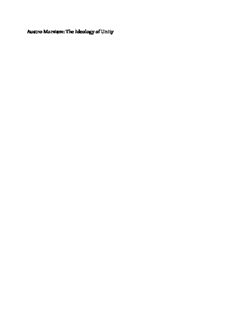
Austro-Marxism: The Ideology of Unity Austro-Marxist Theory and Strategy PDF
Preview Austro-Marxism: The Ideology of Unity Austro-Marxist Theory and Strategy
Austro-Marxism:TheIdeologyofUnity Historical Materialism Book Series EditorialBoard SébastienBudgen(Paris) SteveEdwards(London) JuanGrigera(London) MarcelvanderLinden(Amsterdam) PeterThomas(London) volume109 Thetitlespublishedinthisseriesarelistedatbrill.com/hm Austro-Marxism: The Ideology of Unity Austro-MarxistTheoryandStrategy volume1 Editedby MarkE.Blum WilliamSmaldone leiden | boston LibraryofCongressCataloging-in-PublicationData Austro-Marxism(Brill) Austro-Marxism:theideologyofunity/editedbyMarkE.Blum,WilliamSmaldone. volumescm.–(Historicalmaterialismbookseries,ISSN1570-1522;109) Includesbibliographicalreferencesandindex. Contents:Volume1.Austro-Marxisttheoryandstrategy ISBN978-90-04-21756-0(hardback:alk.paper)–ISBN978-90-04-30634-9(e-book) 1.Austro-Marxistschool.2.Socialists–Austria.3.Socialism–Austria–History.I.Blum,MarkE.,editor.II. Smaldone,William,editor.III.Title. HX253.A9752015 335.43'4–dc23 2015030756 Thispublicationhasbeentypesetinthemultilingual“Brill”typeface.Withover5,100characterscovering Latin,ipa,Greek,andCyrillic,thistypefaceisespeciallysuitableforuseinthehumanities.Formore information,pleaseseewww.brill.com/brill-typeface. issn1570-1522 isbn978-90-04-21756-0(hardback) isbn978-90-04-30634-9(e-book) Copyright2016byKoninklijkeBrillnv,Leiden,TheNetherlands. KoninklijkeBrillnvincorporatestheimprintsBrill,BrillHes&DeGraaf,BrillNijhoff,BrillRodopiand HoteiPublishing. Allrightsreserved.Nopartofthispublicationmaybereproduced,translated,storedinaretrievalsystem, ortransmittedinanyformorbyanymeans,electronic,mechanical,photocopying,recordingorotherwise, withoutpriorwrittenpermissionfromthepublisher. AuthorizationtophotocopyitemsforinternalorpersonaluseisgrantedbyKoninklijkeBrillnvprovided thattheappropriatefeesarepaiddirectlytoTheCopyrightClearanceCenter,222RosewoodDrive, Suite910,Danvers,ma01923,usa.Feesaresubjecttochange. Thisbookisprintedonacid-freepaper. Contents Preface ix part 1 Introduction Introduction 3 part 2 OverviewofAustro-MarxistTheoreticians MaxAdler 19 OttoBauer 39 KarlRenner 56 FriedrichAdler 66 OttoNeurath 77 RudolfHilferding 84 part 3 TheTranslatedTheoreticalTextsoftheAustro-Marxists MaxAdler 93 ‘TheNewConceptofSociation’,inLehrbuchderMaterialistischen Geschichtsauffassung(1930) 93 ‘TheSocialAPriori’,inTheEnigmaofSociety(1936) 102 ‘The“Given”asLivingConsciousness’,inTheEnigmaofSociety (1936) 111 ‘TheActivityofConsciousness’,inTheEnigmaofSociety(1936) 115 ‘SocialBeingandSocialScience’,inTheEnigmaofSociety(1936) 135 vi contents ‘ExcursusonAnarchism’,inDieStaatsauffassungdesMarxismus, Marx-Studien,Vol.4,Part2,Chaptersxv,xvi,xvii,andxviii (1922) 156 ‘WhyWeAreNotUnderstood’,inDieStaatsauffassungdes Marxismus,Marx-Studien,Vol.4,Part2,Chapterxix(1922) 226 ‘BeliefasanEpistemologicalConcept’,inDasSoziologischeinKants Erkenntniskritik:EinBeitragzurAuseinandersetzungzwischen NaturalismusundKritizismus(1924) 230 ‘TheGiveninEthics’,inDasSoziologischeinKantsErkenntniskritik: EinBeitragzurAuseinandersetzungzwischenNaturalismusund Kritizismus(1924) 241 OttoBauer 255 ‘TheConceptofNation’,inTheQuestionofNationalitiesandSocial Democracy(1907) 258 ‘RemarksontheQuestionofNationalities’,DieNeueZeit,Vol.xxv (1908) 281 ‘MarxismandEthics’,DieNeueZeit,Vol.xxiii(1906) 295 ‘IntervalsinHistory’,DerKampf,Vol.3(1910) 315 ‘TheEquilibriumofClassStrengths’,DerKampf,Vol.17(1924) 323 ‘TheTransitionfromtheCapitalisttotheSocialistSociety’,in EinführungindieVolkswirtschaftslehre(1927–8) 339 KarlRenner 368 (Synopticus),StateandNation:AConstitutionalInvestigationofthe PossiblePrinciplesofaSolutionandtheJuridicalPrerequisitesofaLaw ofNationalities(1899) 369 ‘LegalInstitutionsandEconomicStructure’,inTheInstitutionsof PrivateLawandTheirSocialFunctions[DieRechtsinstitutedes PrivatrechtsundIhreSozialeFunktion](1929[1904]) 403 ‘EconomicDemocracy:TheProgrammeofEconomicSelf-Help AmongtheWorkingClasses’,DerKampf,Vol.19(1926) 426 ‘EconomicDemocracy’,DerKampf,Vol.19(1926) 437 FriedrichAdler 455 ‘FriedrichEngelsandNaturalScience’,DieNeueZeit,Vol.xxiv (1906–7) 456 ‘WhyDoWeNeedTheories?(originallyinDerKampf,March,1909)’, inTheRenewaloftheInternational[DieErneuerungder Internationale](1919) 478 contents vii OttoNeurath 489 ‘SociologyasPhysicalism’[SoziologieimPhysikalismus],in Erkenntnis,Vol.2(1931) 489 ‘ProtocolStatements’[‘Protokollsätze’],Erkenntnis,Vol.3 (1932–3) 500 RudolfHilferding 508 ‘Preface’,FinanceCapital,AStudyoftheLatestDevelopmentof Capitalism(1910) 508 ‘TheWorkCommunityoftheClasses?’,DerKampf,Vol.8(1915) 513 Bibliography 527 Index 538 Preface The present volume is part of a two-volume set that aims to bring a wide- rangingandrepresentativeselectionoftheworksofAustro-Marxism’sleading thinkers,includingsuchfiguresasOttoBauer,KarlRenner,RudolfHilferding, MaxAdler,FriedrichAdler,andOttoNeurath,toanEnglishspeakingaudience. Such a project is long overdue. Often referred to as members of the ‘Austro- Marxistschool’,theseactivistsandthinkersplayedadecisiveroleinshapingthe politicalandintellectualhistoryofCentralEuropeduringthefirsthalfofthe twentiethcentury.1Whiletheirtheoreticalcontributionsandpoliticalpraxis addressed the full gamut of socio-economic, political and cultural problems facingEuropeduringthattumultuousera,manyoftheirexperiencesandideas alsoremainpertinenttoday.Coalescingasagroupwithinthemultiethnicand multinationalAustro-HungarianEmpire,theAustro-Marxistsworkedtocon- struct a unified social-democratic movement grounded on mutual trust and co-operation.Inapolitywrackedbyclassstrifeandethno-nationalistdivisions, theireffortsultimatelyfailedtoholdtheempiretogetherasAustria-Hungary, like Germany, collapsed in the fall of 1918. Taking the reins of power in their defeatedandtruncatedhomeland,leaderssuchasBauerandRennergrappled withAustria’spoliticalandeconomicisolationinaregionnowpopulatedbyan arrayofsmall,independent,andoftenhostilestates,whileHilferdingbecame amajorpoliticalfigureinmuchweakenedGermany.InthenewAustrianand GermanRepublicsoftheinterwarera,theAustro-Marxistsworkedtorealise theaimsofdemocraticsocialismthroughthepromotionofdemocraticsocial, economic,andpoliticalreformsathomeandgreaterco-operationandinteg- rationabroad.Operatinginacontradictorycontextofintensifyingglobaleco- nomicandpoliticalrivalries,growinginternationalinterdependenceand,after 1929,deepeningeconomiccrisis,aswellasfacingthegrowingthreatoffascist counterrevolutionathome,theAustro-Marxistswereengagedinstrugglesnot unlikemanyfacingthecontemporaryworld.Theirdefeatdoesnotdiminishthe richnessoftheirthoughtorthevalueoftheirexperienceforunderstandingthe issuesofourowntime.AsRichardSaagehasrecentlynoted: Occupying oneself with the Austro-Marxists … is quite apart from but one more nostalgic flight from the real problems of globalized capital- ism and its neo-Liberal hegemony at the beginning of the 21st century. 1 SeeBottomore’sintroductioninBottomoreandGoode1978,pp.1–2. x preface IfonelosesamemorialawarenessofwhatSocialDemocracyaddressed initsownhistory,ourcontemporaryidentitysuffers,particularlytowards thehumanitytowhichwewouldcontribute.InthelightoftheAustro- Marxist experience in its rise and fall, in its innovations and failures, a relevanceforourowntimeistobefound.2 TheculturalmilieuoftheAustro-Marxists,thearguablysupranationalsociety intowhichtheywereborn,contributedtotheiraimofachievingwhatAustrian culturalhistorianshavecalled‘unityindiversity’.3Examplesofearlierpolitical efforts to achieve this ‘unity in diversity’ can be found in the attempt of the KremsierConstitutionof1849,andinthatguidedbyCountBelcrediin1867, who counseled Franz Joseph to conceive of his role as that of Emperor of a supranational state. Franz Joseph’s installation of the Hohenwart ministry whichsoughtgreaterparticipationandauthorityfortheSlavicpeoplesofthe Empire,andthesubsequentgovernmentundertheleadershipofCountEduard vonTaaffe–whoalsomadeconcessionstotheCzechsandothernon-German nationalities – reflected his effort to greater federalise the national ethnic demandsofCisleithania.4BalancewasneverfullyachievedbeforeWorldWari because of the countervailing demands of the Magyars who wanted a dual, ratherthanafederal,politicalstructure.5TheAustrianSocialDemocraticParty followedasimilarvisionoffederalismwiththeirBrünnProgramof1899.6 GrasslandSmitharguethatjustasthepoliticiansoftheAustro-Hungarian Empirewerecompelledtodeveloppoliciesthatcouldaddressthecentrifugal tendenciesofagrowingnationalandethnicstrivingforautonomywithout- reachtowardsthesedifferenceswhichcouldsomehowgenerateandmaintain interdependent co-operation, thinkers and artists were intuitively drawn to suchframeworksofthoughtintheirowndisciplines.New‘unitiesindiversity’ might be achieved to better accommodate interpersonal realities. Causation heremightbeseenastheroleofcommunityintheshapingofthought,akin toAristotle’sunderstandingofthehumanasazoonpolitikonwhoseframeof reality is the polis in its structuring of interdependent realities. The signific- anceofhowcommunalwholesbetweenpersonandpersonwereformedcould vary; indeed, understanding this possibility of changing structures became a newmetacognitivegroundforthepioneeringthoughtofAustrianminds.For 2 Saage2009,p.63. 3 SeeGrasslandSmith1986,pp.11–30.SeealsoBlum2003,pp.131–42. 4 SeeBeller2006,pp.143–5. 5 Beller2006,pp.145–7. 6 SeeKulemann1979,pp.120–6.
Description: